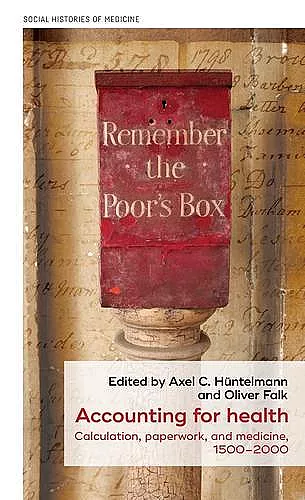Accounting for Health
Calculation, Paperwork, and Medicine, 1500–2000
Axel C Hüntelmann editor Oliver Falk editor
Format:Hardback
Publisher:Manchester University Press
Published:29th Jan '21
Currently unavailable, and unfortunately no date known when it will be back

Whether in the Swiss countryside or in a doctor's office in Boston, in German, English or French hospitals or within multinational organizations, with early vaccinations or with new pharmaceuticals from Big Pharma today, or in early modern Saxon mining towns or in Prussian military healthcare – for at least 500 years, accounting has been an essential part of medical practice with significant moral, social and epistemological implications. Covering the period between 1500–2000, the book examines in short case studies the importance of calculative practices for medicine in very different contexts. Thus, Accounting for Health offers a synopsis of the extent to which accounting not only influenced medical practices over centuries, but shaped modern medicine as a whole.
This book is relevant to United Nations Sustainable Development Goal 3, Good health and well-being.
'Hüntelmann (Charité hospital, Berlin) and Falk (Univ. of Zürich) have brought together a group of gifted scholars to examine the intersecting histories of accounting and medicine, including structures and practices from both endeavors, while also giving due attention to economic history. Geographically, contributors focus on Western Europe and the US. Twin emphases, on recordkeeping and the methods of book history, inform each of the fourteen chapters, perhaps because the volume emerged from a larger project on paper technologies. For instance, in three ledgers kept between 1760 and 1820, Philip Rieder finds different purposes for keeping the records but similar competitions among physicians, who billed by social group rather than by service performed; Theodore Porter explores how 19th-century asylum directors organized data in reports to the state; while Andrea Rusnock shows how medical and financial accounting were mutually reinforcing methods of demonstrating a charity's effectiveness to donors. Other chapters consider various dimensions of medical research as well as public and private insurance in the 20th century. This book is likely to influence and even inspire further academic studies on health care, with impact comparable to that exercised by The History of Mathematical Tables, as edited by Martin Campbell-Kelly and others (CH, May'04, 41-5270), on the broader histories of mathematics and computing.'
--A. K. Ackerberg-Hastings, independent scholar
Summing Up: Highly recommended. All readers.
Reprinted with permission from Choice Reviews. All rights reserved. Copyright by the American Library Association.
'The collection succeeds wonderfully in its goal of knitting together economic and medical history around the concept of accounting.'
Social History of Medicine
ISBN: 9781526135162
Dimensions: 216mm x 138mm x 24mm
Weight: 630g
416 pages